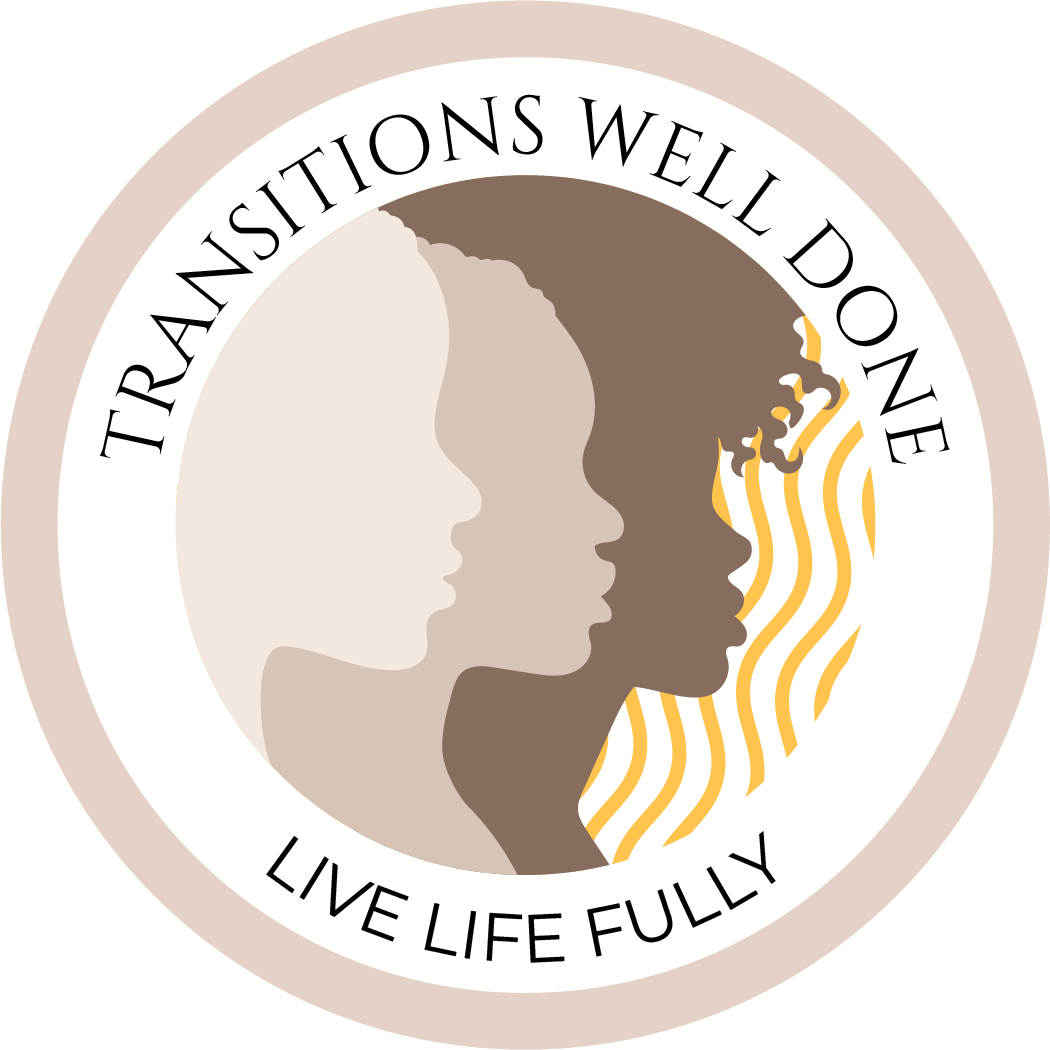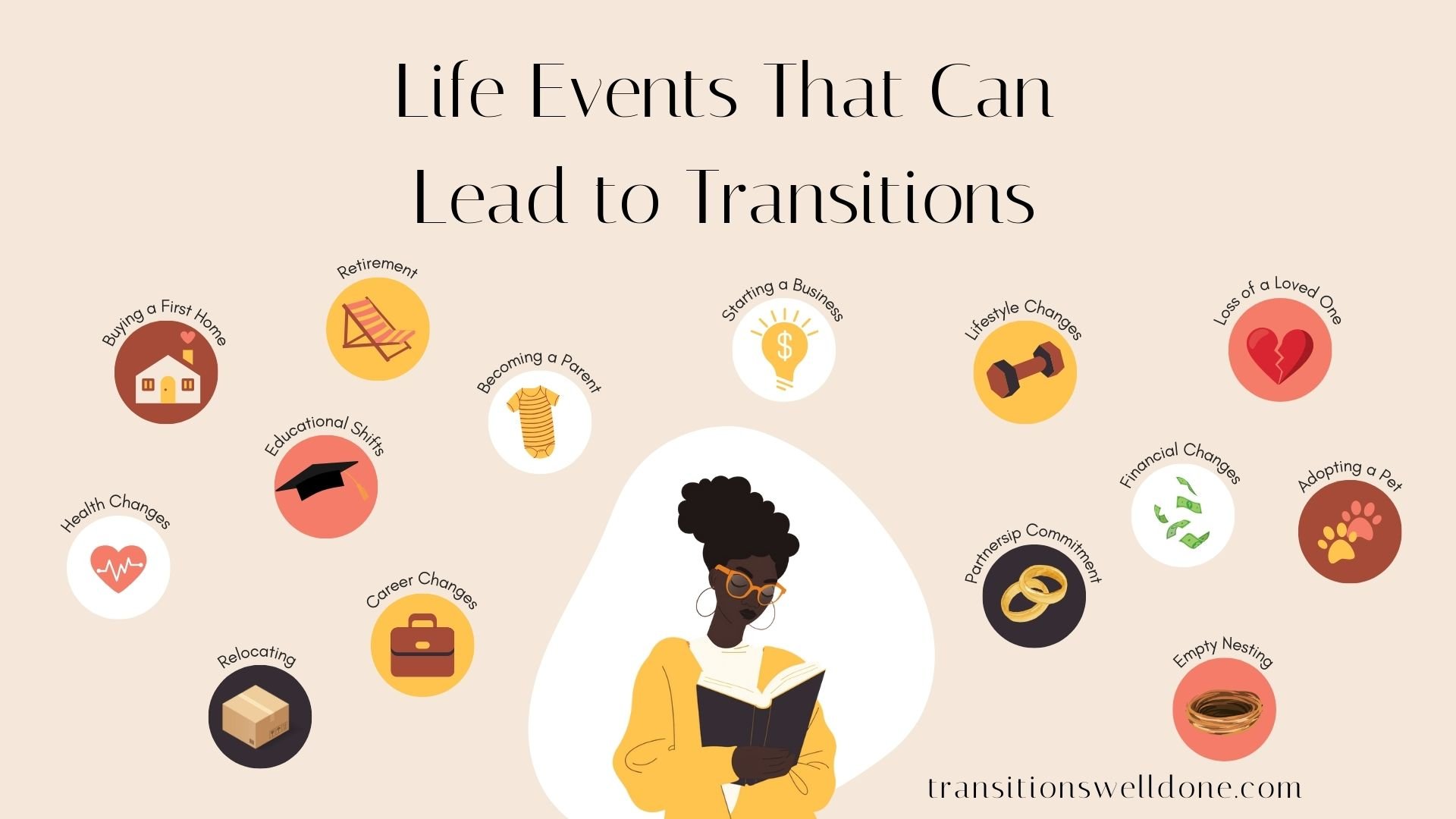
Life Transitions
The ultimate guidE
Welcome to our guide on Life Transitions. This page serves as your introduction to understanding what life transitions are, unveiling the psychological intricacies behind them, and shedding light on why they are so hard to navigate. From here, we'll offer practical tips for navigating these changes, supported by resources developed from my experience as a life transition coach and 20 years of experience working in the non profit sector. Whether you're facing a shift in your career, personal life, or identity, this information is designed to provide clarity and direction, helping you to manage transitions with confidence and ease.
What Are Life Transitions?
Life transitions are the internal journeys we embark upon as we navigate significant changes in our lives. These are not about the physical aspects of change, such as moving to a new city or changing jobs, but rather how we mentally and emotionally adjust to these new circumstances. It's about the psychological shifts and emotional evolution that occur within us as we adapt to our new realities. For instance, relocating for a job involves logistical tasks like packing and finding a new home. However, the transition encompasses the deeper emotional journey—leaving behind familiar faces, embracing new cultural norms, and finding one's place in a new community. This distinction highlights the challenging nature of life transitions: they involve a profound internal process of reorienting our lives and identities, a journey that often takes much longer than the external change itself.
The Three Phases of Life Transitions
Endings: This might sound backward, but it's where every transition starts. It's about acknowledging the losses, both big and small, that come with change. This phase challenges us to recognize what we're moving away from, and to honor what we've lost, whether it's relationships, routines, or roles. It's a time for reflection, to sift through the parts of our lives that are ending, deciding what to carry forward and what to leave behind. This isn't easy; it requires us to face our losses head-on, but it's the crucial first step towards genuine change.
The Neutral Zone: Then comes the neutral zone, a sort of no-man's land between the old and the new. This is where the real internal work happens. The old ways are gone, and the new hasn't fully taken root. It might feel like being lost at sea—unsettling, uncertain. Yet, it's also a period brimming with potential. This is where we're invited to rethink who we are and how we relate to the world. It's a time ripe for innovation, a chance to experiment with new ways of being and doing. The neutral zone, with all its confusion and ambiguity, is the fertile ground from which new beginnings sprout.
New Beginnings: The journey through transition culminates in a new beginning. This is where the seeds planted in the neutral zone start to bloom. New beginnings are about embracing new identities, energies, and purposes. It's a phase marked by a sense of renewal and direction, a readiness to engage with life in a transformed way. Here, we find ourselves equipped to step into new roles and relationships with clarity and confidence. It's not just about adjusting to change; it's about thriving in it, powered by a renewed sense of purpose and belonging.
Navigating through these phases isn't a linear process. It's a journey filled with its own set of challenges and rewards. Recognizing these phases can help us manage life's transitions more gracefully, providing a map for the often bewildering landscape of change.
William Bridges' Transition Model differentiates between the events that happen to us and our internal journey in response. Here's a straightforward look at the three key phases he identifies:
The Types of Life Transitions
Navigating through life, we encounter two significant types of life transitions: developmental and reactive. These transitions, while distinct, are integral to our personal growth and evolution.
Developmental Transitions are the expected chapters in our life’s narrative. They're associated with our progression through different life stages, such as entering adulthood, embracing parenthood, or transitioning into retirement. These milestones inherently prompt a reevaluation of our identity and a shift in our perception of ourselves. For example, becoming a parent profoundly alters our priorities, relationships, and how we see our role in the world. It's a transformative experience that reshapes our identity from the ground up.
However, it's crucial to underline that life does not unfurl in a straightforward, predictable manner for everyone. Traditional life events like marriage, career advancement, or retirement don't encapsulate the entirety of human experience. Acknowledging the unique and non-linear nature of each person’s journey allows us to celebrate diverse life paths without adhering strictly to societal expectations.
Reactive Transitions, in contrast, arise from unexpected life events or external changes that compel us to adapt swiftly. These could range from job loss, a sudden move, health challenges, to the loss of a loved one. Unlike developmental transitions, which are somewhat anticipated, reactive transitions catch us off guard, disrupting our sense of stability and forcing us into a period of adjustment and reflection. These transitions often require us to rapidly reassess our lives, identities, and goals in response to the new circumstances thrust upon us.
The interplay between developmental and reactive transitions highlights the complexity of navigating life’s changes. For instance, retirement, typically considered a developmental transition, can also precipitate a reactive transition. The shift from a structured career to the open-endedness of retirement may trigger a reevaluation of one’s identity and purpose, embodying characteristics of both transition types.
Examples of Events That Can Trigger Life Transitions
Life is filled with moments that, can propel us into periods of significant change, whether joyous or challenging. These events are the starting points for transitions, demanding that we reassess our lives, identities, and paths forward.
Here are some pivotal events that often trigger life transitions:
Starting School or College: This marks a significant step toward independence and the broadening of social and intellectual horizons.
Entering the Workforce: Embarking on a career initiates a new phase of responsibility, identity formation, and community engagement.
Marriage or Partnership Commitment: Such commitments bring about shifts in personal identity and necessitate the merging of lives, goals, and families.
Parenthood: Perhaps one of the most transformative transitions, parenthood profoundly reshapes priorities, relationships, and self-perception.
Career Changes: Whether by choice or circumstance, changing careers can significantly affect our self-esteem and lifestyle.
Relocating to a New City or Country: Moving introduces a host of adjustments, from navigating new environments to forming new social connections.
Experiencing Significant Health Changes: Health diagnoses or injuries require us to adapt our lives and expectations, often leading to deep personal reflection.
Divorce or Separation: The end of significant relationships forces a reevaluation of personal identity and future aspirations.
Retirement: Transitioning out of the workforce marks a profound shift in daily routines, social interactions, and purpose.
Loss of Loved Ones: Grieving is a deeply personal journey that reshapes our lives and understanding of permanence and loss.
Financial Gain or Loss: Significant changes in financial status can lead to shifts in lifestyle, opportunities, and stress levels.
Achieving Personal Milestones: Graduations, promotions, and personal achievements provoke reflection on past efforts and future directions.
Becoming an Empty Nester: Adjusting to life after children have grown and left home challenges our routines and sense of purpose.
Caring for Aging Relatives: Taking on caregiver roles often leads to shifts in family dynamics and personal responsibilities.
Coming Out: For many in the LGBTQ+ community, coming out is a pivotal moment of self-acceptance and the beginning of living more authentically.
Each of these events serves as a point of departure for the internal journey of adaptation and growth that characterizes life transitions. They underscore the multifaceted nature of change, highlighting the importance of recognizing and navigating the unique challenges and opportunities they present.
Benefits of Embracing Life Transitions
Embracing life transitions opens the door to a realm of personal growth, new experiences, and the development of resilience that collectively shape a more enriched and robust existence. At the heart of every transition lies the potential for profound self-discovery. These periods of change prompt us to reflect deeply on who we are and what we truly value, leading to significant personal evolution. During these times we often uncover strengths we didn't know we had and interests that had previously lain dormant.
Personal Growth and Self-Discovery
Transitions act as catalysts for personal growth. They challenge our preconceived notions of who we are, pushing us beyond our comfort zones and encouraging us to explore new aspects of our personalities and capabilities. This journey of self-discovery is invaluable; it fosters a deeper understanding of our desires, fears, and ambitions, setting the stage for a life that aligns more closely with our true selves.
Opportunities for New Experiences and Perspectives
Life transitions also introduce us to new experiences and perspectives. Whether it's a move to a new city, a change in career, or entering a new stage of life, each transition brings with it the opportunity to see the world through a different lens. These fresh experiences enrich our lives, broadening our understanding of the world and the diverse people in it. They teach us to embrace flexibility and open-mindedness, qualities that are essential in today's ever-changing world.
Building Resilience and Strength
Perhaps one of the most significant benefits of navigating life transitions is the development of resilience. With each challenge overcome, our ability to withstand adversity grows stronger. This resilience is not just about bouncing back; it's about moving forward with a greater sense of purpose and confidence. The strength we gain through overcoming the uncertainties and trials of transitions equips us to face future changes with grace, understanding that each end is the beginning of something new and, potentially, even better.
Why Are Life Transitions So Hard?
Ever wonder why, even when we see changes coming or even wish for them, they can still feel so heavy and hard? It's not just you feeling this way; it's something we all go through. Life transitions can be tricky because they touch on so much more than just the external changes we can see and touch. They stir up what's inside us, reshaping our thoughts, feelings, and even who we think we are.
Understanding the psychology behind life transitions
Delving into the psychological underpinnings, it becomes clear why life transitions are so hard to navigate. At their core, they're about loss and the unknown. Whether it's a role we've outgrown or a familiar setting we're leaving behind, transitions force us to let go of parts of our identity that have defined us. This sense of loss isn't just about physical things; it's deeply emotional, affecting how we see ourselves and our place in the world.
Our brains are hardwired to seek stability. The comfort of the known is much preferred, even if it's less than ideal because it's familiar. When faced with change, our stress levels spike, pushing us into a state of alertness. It's a protective mechanism, sure, but it also means that stepping into the unknown is inherently stress-inducing. Adding to this is the fear of loss. It's not just about losing the tangible aspects of our lives but also the potential loss of social connections, status, or even self-esteem. These fears can be amplified for those of us who've had to work harder to carve out our place in the world, making the thought of starting anew even more daunting. And then, there's the challenge of redefining our identity. Who are we when we're not the professional, the partner, or the parent in the ways we used to be? Navigating these identity shifts is perhaps the most profound aspect of life transitions. It's not simply about adapting to new circumstances but about fundamentally reevaluating who we are and what we value.
This process of letting go, facing the unknown, and redefining ourselves is at the heart of why life transitions are so hard. It's a deep, internal journey that goes far beyond the external changes happening around us.
Following this path, it's entirely normal to experience a whirlwind of emotions, even in moments that are traditionally seen as joyous. Take becoming a parent, for example. It's a time that brings immense joy, yes, but it's also accompanied by a torrent of other feelings. Anxiety, doubt, exhaustion, and even a sense of mourning for the life you've left behind can all surface amid the happiness. It's a vivid reminder that our emotional landscapes are rich and varied, capable of holding joy and sorrow, excitement and fear, all at once. In times of significant change, it's perfectly natural to find yourself navigating this complex spectrum of emotions. Understanding that these feelings are a normal part of the process can be a source of comfort and strength, offering us a compass as we find our way through the beautiful, messy reality of life's transitions.
How to Manage Life Transitions
Navigating life transitions involves directly facing the mix of familiar and new challenges that come with change. It's crucial to openly acknowledge the change and the strong emotions it triggers. Accepting these feelings is the first step toward a deeper understanding of how the transition reshapes our lives, guiding us from a sense of loss to recognizing potential for personal growth and new discoveries about ourselves. Let all the feelings out. Whether it's the thrill of a new opportunity or the pain of a loss, acknowledging these feelings is a vital first step. It opens the door to self-reflection, allowing us to see change not as an obstacle but as a pathway to growth and new possibilities.
Building a supportive network is another cornerstone of managing transitions. The strength found in connections with friends, family, and community underscores the importance of not going through changes in isolation. These relationships provide comfort, insight, and practical assistance, reinforcing the notion that you're not alone on this journey.
And finally, there's nothing wrong with seeking professional support. A life coach, therapist, or counselor can provide guidance, strategies, and a fresh perspective. As a life transition coach with firsthand experience in managing significant changes, I aim to support you through these challenging yet transformative times. Together, we'll explore your transition, identifying both the hurdles and the possibilities to craft a path that aligns with your aspirations and values. Whether your journey involves shifts in your career, personal life, or identity, life transition coaching equips you with a versatile set of skills. This 'toolkit' is designed not only to help you manage the present transitions but also to prepare you for future challenges, offering a foundation of strategies and insights that you can rely on throughout your life.
Need to talk?
Schedule a free chat!
This is a free and non-binding 30-minute intro conversation, where we get to know each other and find out if we are a good match.
FAQs on
Life Transitions
-
Absolutely. Feeling lost or uncertain is a common reaction when navigating significant changes in life. It reflects the process of adjusting to new circumstances and redefining one's identity and goals.
-
The adjustment period can vary greatly depending on the individual and the nature of the transition. Some people might find their new normal within a few months, while others could take years to fully adapt. It's important to be patient with yourself and allow the process to unfold naturally.
-
Yes, life transitions often serve as catalysts for personal growth. They can challenge us to develop resilience, learn new skills, and gain deeper insights into our values and aspirations.
-
Even positive changes, like a new job or becoming a parent, can be stressful and require adjustment. While these transitions bring joy and excitement, they also come with new challenges and responsibilities that can take time to integrate into one's life.
-
Yes, it's possible to face multiple transitions simultaneously. Prioritizing your well-being, focusing on one thing at a time, and seeking support can help manage the overwhelm. It's also important to recognize and accept your limits during these times.
-
Life transitions can be stressful and may impact well-being, potentially leading to physical and mental health concerns. Acknowledging these feelings and seeking appropriate support is key to navigating these changes healthily.





